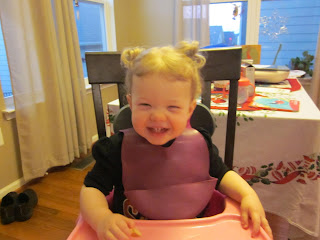 |
| The next Wicked Witch of the West? |
One of the great pleasures of having
grandkids is sharing your treasures with them. Last weekend I got to watch one
of my favorite movies, THE WIZARD OF OZ, with my nearly two-year-old
granddaughter. What fun!
Now, some of you may be thinking she would be
scared. Flying monkeys! Evil witches! Talking trees! Not my little warrior. Wanna guess who her
favorite character was?
The Wicked Witch of the West.
Every time that cackling, evil presence was
off-screen, the sweet little girl sitting beside me was asking, “Where the
witch? Where the witch?”
At some point the witch did something appropriately
evil, and I commented,” Oooh, she’s mean!”
My little angel turned to her mom and said, “I mean. I the witch.” She was quite proud of herself, too.
Rather than think my granddaughter has
self-esteem issues, I was amazed at how smart and perceptive she was. She’s not
even two, and she could tell who held the power in Oz, at least for 90 percent
of the film. Forget Dorothy, who for most of the film was too polite, too
afraid and just plain not assertive enough to take that power. My daughter’s
little girl wanted the power. “I the witch!”
 Of course, she’s too young yet to recognize
that the whole point of THE WIZARD OF OZ is that Dorothy must come into her
own. As the protagonist of the story, Dorothy must grow, and, like her
companions, gain courage, heart and intelligence enough to use the assets she
has (the ruby slippers) to reach her goals (to get home). That is what makes
this great drama in the guise of a children’s story. The protagonist, an
ordinary person in every way at first, grows and evolves into a true heroine.
Of course, she’s too young yet to recognize
that the whole point of THE WIZARD OF OZ is that Dorothy must come into her
own. As the protagonist of the story, Dorothy must grow, and, like her
companions, gain courage, heart and intelligence enough to use the assets she
has (the ruby slippers) to reach her goals (to get home). That is what makes
this great drama in the guise of a children’s story. The protagonist, an
ordinary person in every way at first, grows and evolves into a true heroine.
In modern literature and drama, we seem to be
in danger of missing this point. Like my granddaughter, we’re far too enamored
of the dark side, thinking it holds all the power. The last two literary
bestsellers I read—Gone Girl and The Girl on the Train—featured
protagonists who were not only unlikeable, unreliable and morally questionable,
but who also failed to change and grow. Popular and award-winning television
shows—THE SOPRANOS, BREAKING BAD, SONS OF ANARCHY, MAD MEN—follow the same
pattern. We watch the characters in these shows like we watch a slow-motion
train wreck, hoping for redemption or salvation, only to be disappointed. In
the end these protagonists fail to learn anything from their actions.
Even in our own genre, we skirt the edge of
this fascination with the darkness. Our heroines must all be kickass from the
beginning, our heroes alpha enough to take them on. Allowing for growth and
change in those circumstances is a difficult job of writing. It means we must
allow for vulnerability somewhere, for internal
obstacles to be overcome. Too often a writer will handle this by avoiding the
need for growth at all. The kickass heroine stays the same throughout the book,
yielding a character made of cardboard. Alternately, our strong couple turns to
goofy mush once the romance starts. That’s no solution, either. Real flaws in a
character can only be healed by the character’s real work throughout the book.
Just like in real life.
Of course, you could say that all this
obsession with the darkness in our literature and our media entertainment
simply reflects our culture. But it also shapes our culture. Hard to say which
comes first. As a writer, if I’m in the business of leading readers in one
direction or the other, I say let’s follow the light. I want my characters to
find their brains, their hearts, their courage, and use what they have found to
get themselves home.
And not too long from now I’ll hear my
granddaughter say, “I’m strong and smart. I’m Dorothy!”
Cheers, Donna

I think you just articulated why when I binge-watch a season of Mad Men I'm depressed for three days.
ReplyDeleteMy girl loves antagonists too. The scarier the better. She is truly the only person I know who loves nightmares -- she gleefully recounts them the morning after, describing the feats she performed to escape the baddies. She's going to be a writer like her mom, or a ninja.
I'm with you. I'm in the mood for some good guys who are actually good.
ReplyDeleteYou make a very good point. So often convention dictates that our characters come out of the first page raring to go. Maybe we should go back to an earlier tradition, and give characters room and time to change. Like Bilbo, and Frodo. And Dorothy.
ReplyDeleteLOL, Sharon. Maybe inventing those escapes is the expression of that writer gene. But I became a martial artist years ago to learn how to manage those feats on the page--now I could pretty much do them in real life, too! Right on, Pauline, hooray for the good good guys--exactly like Bilbo and Frodo and Dorothy, Greta!
ReplyDelete